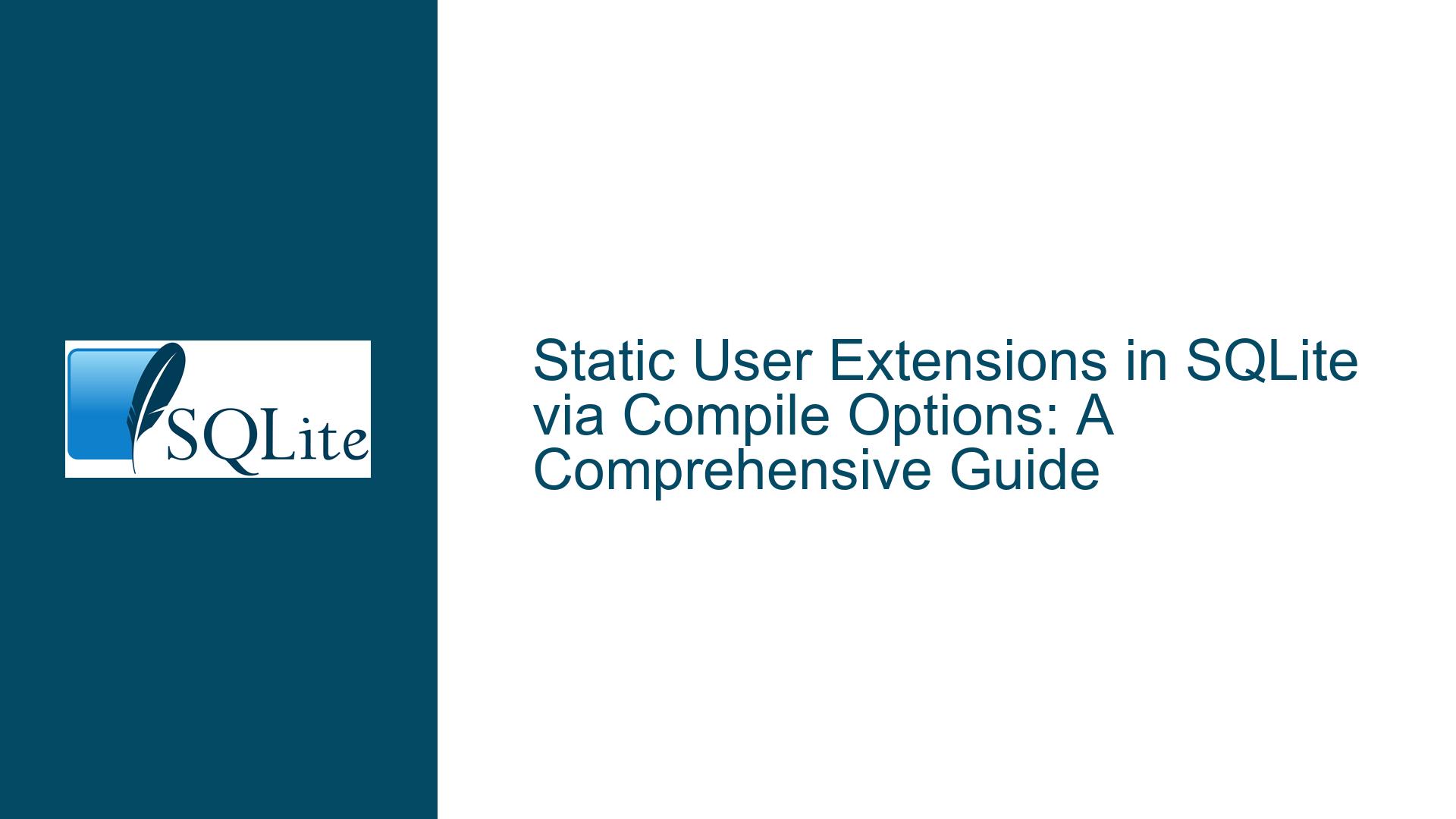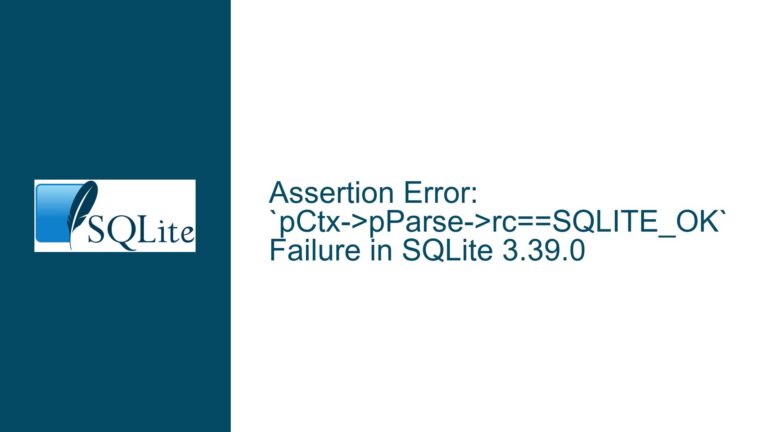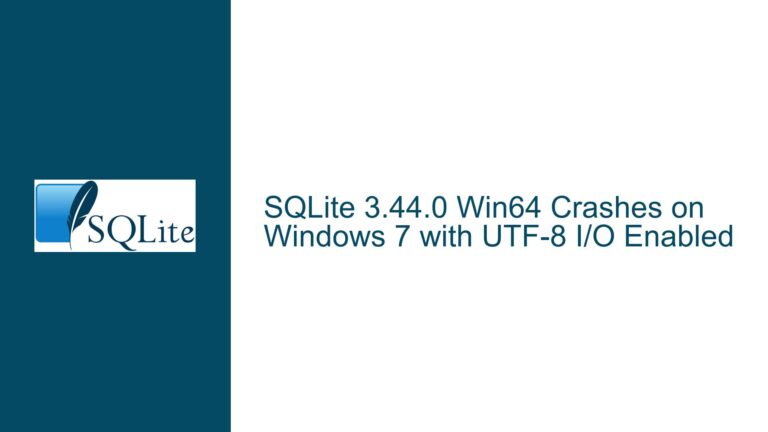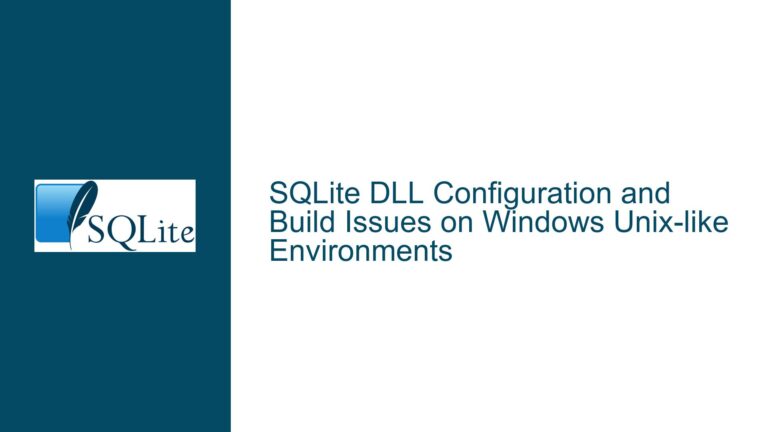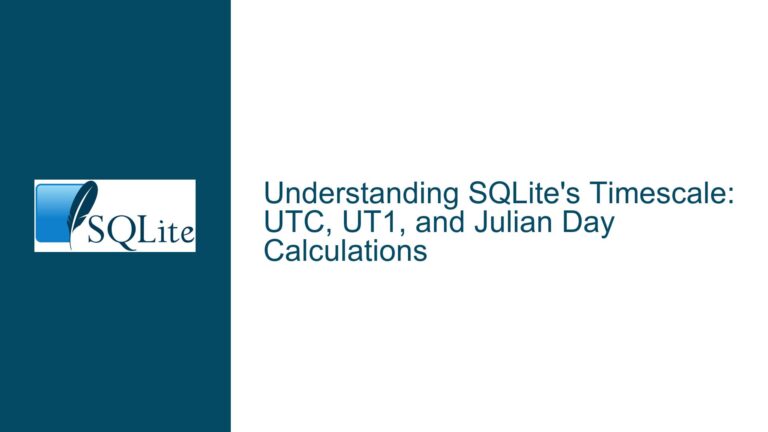Static User Extensions in SQLite via Compile Options: A Comprehensive Guide
Static User Extensions in SQLite: The Need for Compile-Time Integration
The integration of third-party extensions into SQLite without modifying the core SQLite source code is a common challenge faced by developers who rely on custom virtual tables, SQL functions, or other extensions. The primary issue revolves around the need to statically build these extensions into SQLite in a way that avoids direct modifications to the sqlite3.c file or other third-party packages that utilize SQLite. This is particularly important in corporate environments where modifying third-party source code can trigger compliance and policy concerns, even for liberally licensed projects like SQLite.
The core of the problem lies in the current mechanisms for registering extensions. While SQLite provides functions like sqlite3_auto_extension() for dynamically registering extensions, these methods are not always feasible in environments where SQLite is embedded into other tools or where the initialization sequence of extensions is tightly controlled. Modifying the sqlite3.c file directly to add extensions to the built-in init list is a common workaround, but this approach complicates version control, source management, and compliance processes.
The proposed solution involves introducing a compile-time option that allows developers to statically link their extensions into SQLite without altering the core source code. This would be achieved by defining a new compile directive, such as SQLITE_ENABLE_USER_EXTENSION, which would enable a developer to specify an initialization function for their extension. This function would then be linked into the SQLite build, providing a clean and maintainable way to integrate custom extensions.
The Role of SQLITE_EXTRA_INIT and SQLITE_EXTRA_AUTOEXT
One of the key insights from the discussion is the existence of the SQLITE_EXTRA_INIT compile option, which already provides a mechanism for developers to define an additional initialization function that is called when SQLite starts. This function, defined with -DSQLITE_EXTRA_INIT=foo, must be implemented and linked into the build. However, this approach has limitations, particularly in scenarios where client code might clear the list of auto-extensions, thereby undermining the reliability of the extension initialization process.
The SQLITE_EXTRA_AUTOEXT option, introduced in the SQLite trunk, addresses some of these limitations by allowing developers to specify an auto-extension function that is automatically registered during SQLite initialization. This function must have the signature of an auto-extension, and it is linked into the build similarly to how SQLITE_EXTRA_INIT works. However, this approach still requires careful consideration of the initialization sequence and potential interactions with other extensions or client code.
Integrating Extensions into the Amalgamation Build Process
A significant part of the discussion revolves around the build process, particularly the need to integrate custom extensions into the SQLite amalgamation. The amalgamation is a single-file version of SQLite that includes all the necessary source code, making it easier to distribute and build. However, adding custom extensions to the amalgamation requires modifications to the build files, such as makefile.in and main.mk.
The proposed solution involves adding a new variable, EXTRA_SRC, to the build files. This variable would allow developers to specify additional source files to be included in the amalgamation. For example, a developer could use the following command to build SQLite with custom extensions:
$ make sqlite3.c EXTRA_SRC="my.c my-other.c"
This approach provides a flexible and maintainable way to integrate custom extensions into the SQLite build process without requiring direct modifications to the core build files. It also aligns with the broader goal of enabling static linking of extensions while minimizing the impact on the build system.
Troubleshooting Steps, Solutions, and Fixes
To effectively troubleshoot and resolve issues related to static user extensions in SQLite, developers should follow a systematic approach that addresses both the technical and procedural aspects of the problem. Here are the key steps to consider:
Evaluate the Need for Static Linking: Before diving into the technical details, it’s important to assess whether static linking is the best approach for your use case. Consider factors such as the complexity of your extensions, the environments in which SQLite will be deployed, and the potential impact on compliance and policy requirements. If dynamic registration via
sqlite3_auto_extension()is feasible, it may be a simpler and more maintainable solution.Understand the Existing Mechanisms: Familiarize yourself with the existing mechanisms for integrating extensions into SQLite, particularly
SQLITE_EXTRA_INITandSQLITE_EXTRA_AUTOEXT. These options provide a foundation for static linking and can be used to achieve many of the goals outlined in the discussion. Review the SQLite documentation and source code to understand how these options work and how they can be adapted to your specific needs.Implement and Test the Extension Initialization Function: If you decide to use
SQLITE_EXTRA_INITorSQLITE_EXTRA_AUTOEXT, implement the corresponding initialization function and ensure that it correctly registers your extensions. Test the function in a controlled environment to verify that the extensions are properly initialized and that they function as expected. Pay particular attention to the initialization sequence and any potential interactions with other extensions or client code.Modify the Build Process: If you need to integrate your extensions into the SQLite amalgamation, modify the build files (
makefile.inandmain.mk) to include theEXTRA_SRCvariable. This will allow you to specify additional source files to be included in the amalgamation. Test the modified build process to ensure that the custom extensions are correctly included and that the resulting SQLite binary functions as expected.Address Potential Issues with Auto-Extensions: If you are using auto-extensions, be aware of the potential issues related to the initialization sequence and the possibility of client code clearing the list of auto-extensions. Consider implementing safeguards to ensure that your extensions are reliably initialized, even in scenarios where the auto-extension list is modified. This may involve additional checks or fallback mechanisms to handle unexpected conditions.
Monitor and Update the Solution: Once you have implemented a solution for static linking of extensions, monitor its performance and stability in production environments. Be prepared to update the solution as needed to address any issues that arise or to accommodate changes in the SQLite codebase or your own extensions. Regularly review the SQLite documentation and community discussions to stay informed about new features or best practices that may impact your solution.
By following these steps, developers can effectively troubleshoot and resolve issues related to static user extensions in SQLite, ensuring that their custom extensions are reliably integrated into the SQLite build process without compromising maintainability or compliance.
